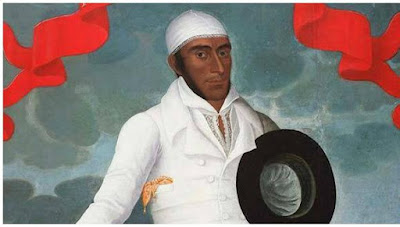For the New Intellectual
Marco Roncagliolo
Ayn Rand
When a man, a business corporation o an entire society is bankruptcy, there are two courses:
• evade reality of the situation
• Or identify the situation, check the premises, discover their hidden assets and start rebuilding.
America´s tragic error: the solution is to turn anti-intellectual. A culture cannot exist without ideas. Is like a body without a head.
Historically:
• In savage societies were no intellectuals.
• In the Middle Ages were only monks in monasteries.
• In Post-Renaissance were intellectuals as philosophers, teachers, writers, scientists without a profession.
Two figures:
• Attila, the man who rules by brute force; the man of force.
• Witch Doctor, the man who dreads physical reality, dreads practical action, and escapes emotions into visions of mystic realm; the man of faith.
• The ballast consists of those who go through life in a state of unfocused stupor, merely repeating the words and the motions they learned from others.
History of Intellectuals and Philosophers
• Aristotle: the father of logic, world´s first intellectual.
His system: one reality, which man perceives; and the objective absolute, the taks of man´s consciousness is to perceive.
• Greco-Roman civilization dominated by Attila.
• Middle Ages ruled by the Witch Doctor, mutually alliance with Attila.
• Renaissance blasted the rule of the Witch Doctor.
• Industrial Revolution blasted Attila off his throne, for the first time men discovered science and political freedom.
• The first society in history whose leader was neither Attilas nor Witch Doctors was the United States by the Producers.
Professions
• Intellectual is the eyes, ears and voice of a free society, his job is: observe the events of the world, evaluate their meaning and to inform the men in all the other fields.
• Businessman is the field agent of the army whose lieutenant in chief.
• Scientist carries scientific discoveries from the laboratory of the inventor to industrial plants and transforms them into material products that fill men´s physical needs and expand the comfort of men´s existence.
Post Renaissance Period of Philosophers
Descartes: premise that every Witch Doctor, the existence of an external world must be proved by deduction from the contents of one´s consciousness.
Hume consciousness limited to the perceptual level of awareness, passively reacting to the experience of immediate concretes, no capacity to form abstractions, to integrate perceptions into concepts.
Kant gave metaphysical expression to the psycho-epistemology of Attila and the Witch Doctor primordial existential relationship. Man´s main concepts are not derived from experience or reality from an automatic system of filter in his consciousness.
Auguste Comte, founder of Positivism, advocated a rational, scientific social system, comer of altruism: placing of other above self, of other interest one´s own.
Nietzche rebellion against altruism sacrifices oneself to other by the sacrifice of other to oneself, a double surrender of morality to the Witch Doctor.
Jeremy Bentham, champion of Capitalism, “the greatest happiness of the greatest number”, this would be to sacrifice the minority to the majority.
Herbert Spencer chose to decide theory of evolution and adaptation of environment, the key to man´s morality and moral justification of capitalism was the survival of the species.
Karl Marx, the translator of altruism in to practical and political theory, advocated a society all would sacrifice to all.
The great treason of the philosophers was that they, the thinkers, defaulted on the responsibility of the providing a rational society with a code of rational morality.
Philosophical Antidote
Businessman was offered neo-mystic Attila-ism of the Pragmatists, whatever one wishes to be true is true, but whatever wishes to exist, does exist.
Scientist knowledge consists of words unrelated to objects, of arbitrary social convention.
Philosophical Attilanism
Two conditions:
• Certainty is unknowable to man
• Absolute knowledge lie outside the sphere of science
Three injunctions of the American Culture
• Don’t Look
o The integration of knowledge into a coherent sum and view of reality is denounced by all the Attila-ism as irrational mystical and unscientific. Science was born as a result of consequence of philosophy, it cannot survive without a philosophical base (epistemology).
• Don’t Judge
o The ultimate climax of altruism is that men plead forgiveness of an unconfessed evil, react with instantaneous compassion to any guilt, while turning away indifferently to the victims and the innocent.
• Don’t be Certain
o Many intellectuals suggest that if nobody is certain of anything, no dictator wil rise among us and we will escape the destruction. Is the opposite, the Dictator runs from the sings of confident resistance, but he can rise in a society with uncertainty, complaint, shaking compromise, this invites a thug to take over.
Who is the New Intellectual?
o Any man or woman who is willing to think. All Those who know that man´s life must be guided by reason, those who valued their own life and are not willing to surrender it to the cult of despair in the modern jungle of cynical impotence.
o Characteristics: reunion of the intellectual (the practical thinker) and the businessman (the philosophical businessman).
o The man´s right to exist for his own sake neither sacrificing himself to other nor sacrificing other to himself; and that the political implementation of this right is a society where men deal with one another as traders, by voluntary exchange to mutual benefit.
o Two principles: a. the basic rejection of the Witch Doctor psycho epistemology, one must differentiate one´s thought and one´s emotions with full clarity and precision; b. the basic rejection of the Attila´s psycho epistemology, to claim the right to initiate the use of physical force against another man is to evict oneself automatically from the realm of rights, morality and of the intellect.


Comentarios
Publicar un comentario